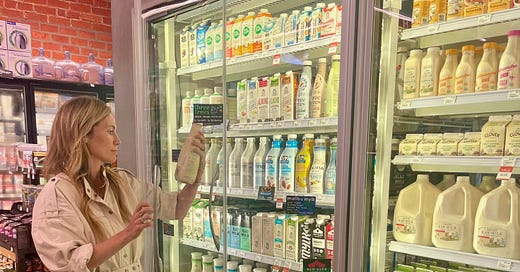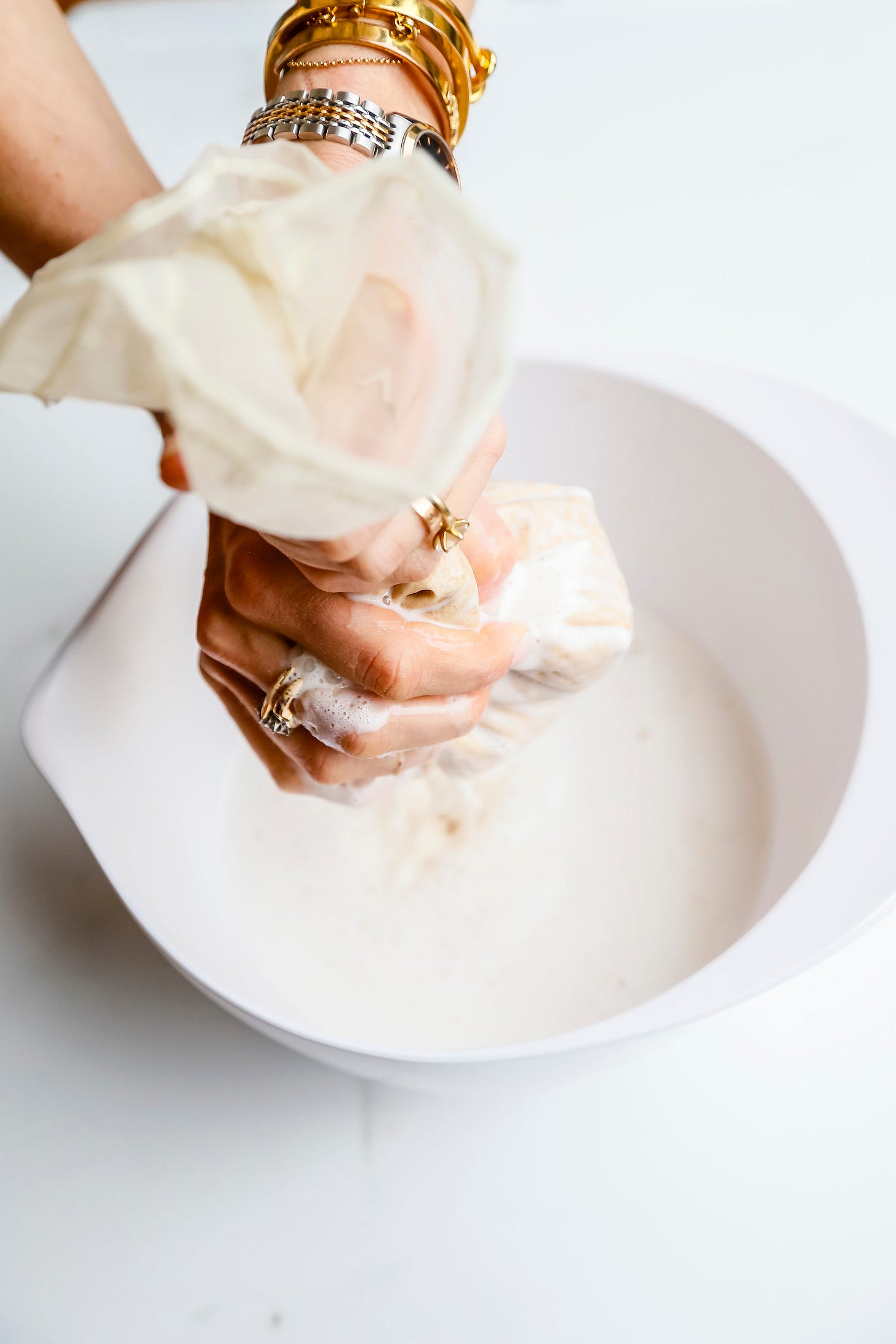Ah, the milk aisle. Once a simple stop, now a whole (complicated and controversial) thing. Cow’s milk, oat milk, almond, soy, coconut, macadamia…the list goes on. So which one is healthiest?
The truth is, it depends. If you opened this hoping for a definitive answer, I’m sorry to disappoint—there’s just no one-size-fits-all answer here. Your milk of choice really comes down to your personal preferences, dietary needs, and how your body responds. But I do think there are a few helpful things to understand when making your choice.
Let’s break it down.
Why some people skip cow’s milk.
Some people avoid cow’s milk because they’re lactose intolerant, allergic to dairy, or simply don’t love the taste. Personally, I grew up in a house that didn’t drink milk—my dad is lactose intolerant so I never drank it and (likely as a a result) I don’t like the taste of cow’s milk.
If you’re like me (or my dad) this is where plant-based milks come in: they offer a non-dairy alternative that can be easier to digest and, in some cases, lower in calories, fat or carbs.
But not all alt milks are created equal.
What makes some alt milks less healthy?
One word: processing.
Most plant-based milks are made by soaking, milling, filtering, and blending raw ingredients (like oats, almonds, or soy) with water. From there, manufacturers often add oils, thickeners, gums, stabilizers, and sugar to improve texture and shelf life. If you’ve ever tried to make a cappuccino with a the non barista blend almond milk, you know why they do this.
But this is where things start to get a little dicey.
Added oils can increase omega-6 load (which most of us already get too much of—if you want to learn more, you can read all about it in my seed oil post from earlier this year).
Added sugars can spike blood sugar (especially if you’re drinking them on an empty stomach).
Gums and stabilizers (like gellan gum, guar gum, or carrageenan) can cause digestive upset in some people and may alter the gut microbiome.
Starches in oat milk convert to simple sugars during processing, making it one of the highest-carb options. (For context: your morning oat milk latte often has the same amount of carbs as a slice of bread—and that’s before you’ve eaten anything.)
Let’s compare: nutrition at a glance
Here’s how the most common milk options stack up nutritionally (based on 1 cup servings):
Note: If you insist on oat milk, please choose organic—conventional oats are heavily sprayed with glyphosate.
What I look for in a milk (and what I teach clients to look for)
Read. The. Label. I’m always looking at both the ingredients and the macronutrient breakdown when deciding what milk (or anything) that I want to buy.
1. Ingredients:
Ideally, you want to see the main ingredient (like almonds or soybeans), water, and maybe sea salt or vanilla. Watch out for:
Added sugar (including “evaporated cane juice” or syrups)
Industrial oils
Gums and emulsifiers
2. Macronutrient breakdown:
What you want will depend on your goals, but here is some interesting info:
Protein: Soy milk is the highest, followed by cow’s milk.
Fat: Cow’s milk and coconut milk are the most rich.
Carbs: Oat milk takes the lead here.
So, what’s the “best” milk?
There’s no perfect answer, but knowing what to look for gives you the power to make the best choice for you. Whether you’re in it for the protein, trying to minimize additives, or just want a splash in your coffee that won’t spike your blood sugar, the goal is informed choice, not perfection.
After a lot of internal debate, I have decided that my milk of choice for my daily flat white is Eden Food’s Organic Unsweetened Soy Milk. I use 1/2 cup daily to make my flat white—it foams, doesn’t separate, is made from two simple ingredients (organic soybeans and purified water), and add 6g of protein. For smoothies, I will normally buy a minimally processed almond milk like Three Trees or Malk.
At the coffee shop, however, it’s not that easy. Most coffee shops (even in bougie Los Angeles) don’t have great milks. They have conventional cows milk (read: not organic, grass fed), barista blend almond milk (read: gums and added sugar), and oatmilk (read: glyphosate and lots of carbs). Now a little bit of any of these milks is likely not going to make a huge difference in your life, but a latte generally has more than a cup of milk, so…choose wisely. I go for a cappuccino (less milk) or a splash of whatever I feel like and go about my day. But, most of the time, I drink coffee from home because I love my milk situation.
Of course, you could also make your own. Just blend 1 cup of nuts soaked overnight with 3-4 cups of filtered water, a pinch of sea salt and maybe some vanilla and cinnamon. Filter through a mesh bag and voila, milk. It’s pretty damn good in coffee if you have the stamina for it.
What about raw milk?
This is not really a debate the I’m interested in, but I can’t do a post on milk and not address it.
Raw milk is unpasteurized and unhomogenized, meaning it hasn’t been heat-treated to kill bacteria or processed to make the fat uniformly distributed. Team raw milk argue that it retains more beneficial enzymes, probiotics, and fat-soluble vitamins (like A and D) that may be diminished during pasteurization. Some also find it easier to digest, possibly due to the presence of naturally occurring lactase (the enzyme that digests lactose).
So why is it controversial? Raw milk carries a higher risk of bacterial contamination (think: E. coli, Salmonella, Listeria), which is why it’s illegal in many states and heavily regulated in others. If you’re curious about it, I’d only recommend sourcing it from a small, trusted farm that tests regularly and follows rigorous safety protocols.
Nutritionally, raw milk has a similar macronutrient profile to organic whole milk (about 8g protein, 8–9g fat, and 12g carbs per cup) but with a creamier taste and a bit more complexity in flavor.
As someone who does not like the taste of milk, I don’t have a huge opinion on this. If you want to try it, make sure to get from a safe and reputable source. If the chance of a food born illness freaks you out, just get an organic, grass fed pasteurized milk. And, if you’re pregnant, immune compromised, or buying for children, please take extra precautions.
Got a favorite milk (or a question about one)? Leave a comment and let me know—I love hearing how people navigate this one.














Mia - well written! I try to explain this to my clients but it is often overwhelming for them to understand. Your blog outlines it so well. Thank you!
What are your thoughts on consuming soy milk (or any soy product) in relation to the isoflavones it contains that mimic estrogen? I would love to drink it daily as well but concerned about possible unwanted side effects.